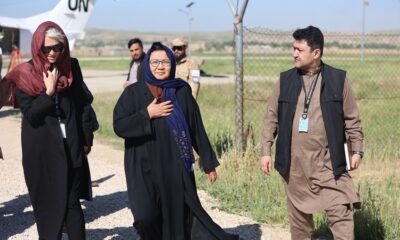World
US tells Israel that escalations in Middle East serve no one
The latest bloodshed in the decades-old Israeli-Palestinian conflict was triggered on Oct. 7 when Hamas attacked Israel, killing 1,200 and taking about 250 hostages, according to Israeli tallies.
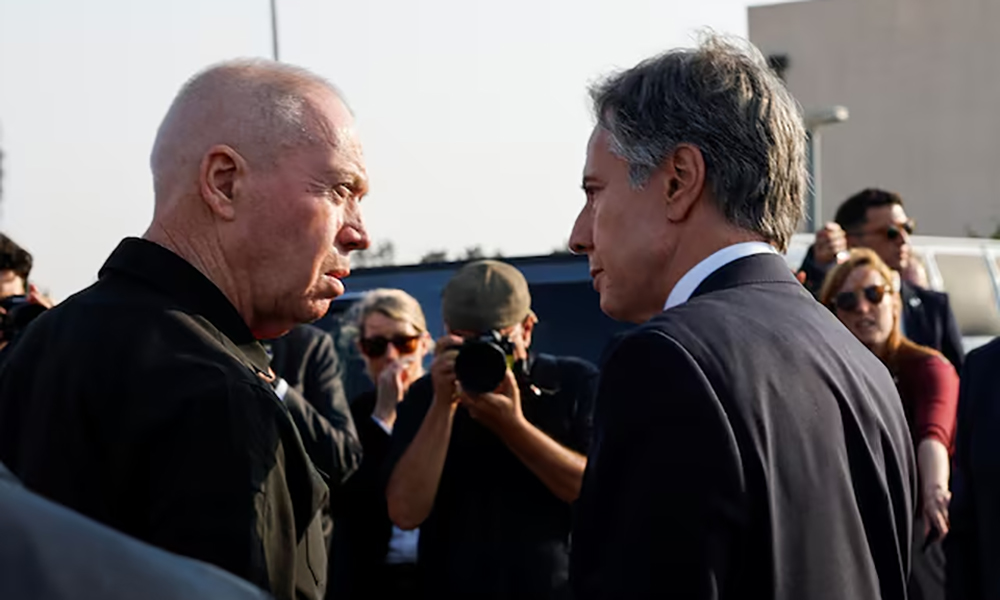
U.S. Secretary of State Antony Blinken told Israeli Defense Minister Yoav Gallant in a phone call on Friday that the escalation of tensions in the Middle East was “in no party’s interest” while also stressing the need for a Gaza ceasefire, the State Department said.
There has been an increased risk of escalation into a broader Middle East war after recent killings of Palestinian Islamist group Hamas’ leader Ismail Haniyeh in Iran and of Hezbollah military commander Fuad Shukr in Beirut drew threats of retaliation against Israel, Reuters reported.
As a result, many fear a widening of Israel’s war in Gaza that has already killed tens of thousands and caused a humanitarian crisis, following Hamas’ Oct. 7 attack on Israel.
“The Secretary reaffirmed the United States’ ironclad commitment to Israel’s security and discussed how escalation is in no party’s interest,” the State Department said in a statement.
Blinken stressed the “urgent need to reach a ceasefire in Gaza” that could release hostages held in the enclave and “create the conditions for broader regional stability,” the State Department added.
A day earlier, Gallant spoke to U.S. Defense Secretary Lloyd Austin about the situation in the region, read the report.
The latest bloodshed in the decades-old Israeli-Palestinian conflict was triggered on Oct. 7 when Hamas attacked Israel, killing 1,200 and taking about 250 hostages, according to Israeli tallies.
The Gaza health ministry says that since then Israel’s military assault on the Hamas-governed enclave has killed nearly 40,000 Palestinians while also displacing nearly the entire population of 2.3 million, causing a hunger crisis and leading to genocide accusations that Israel denies.
President Joe Biden laid out a three-phase ceasefire proposal in an address on May 31. Washington and regional mediators have since tried arranging the Gaza ceasefire-for-hostages deal but have consistently run into obstacles.
World
Trump and Zelenskiy meet one-on-one in Vatican basilica to seek Ukraine peace

U.S. President Donald Trump and Ukrainian leader Volodymyr Zelenskiy, in Rome for the funeral of Pope Francis, met one-on-one in a marble-lined Vatican basilica on Saturday to try to revive faltering efforts to end Russia’s war with Ukraine.
Zelenskiy said the meeting could prove historic if it delivers the kind of peace he is hoping for, and a White House spokesman called it “very productive”.
The two leaders, leaning in close to each other with no aides around them while seated in St Peter’s Basilica, spoke for about 15 minutes, according to Zelenskiy’s office, which also released photographs of the meeting.
The meeting at the Vatican, their first since an angry encounter in the Oval Office in Washington in February, comes at a critical time in negotiations aimed at bringing an end to fighting between Ukraine and Russia.
In a post on social media platform Telegram, Zelenskiy wrote: “Good meeting. One-on-one, we managed to discuss a lot. We hope for a result from all the things that were spoken about.”
He said those topics included: “The protection of the lives of our people. A complete and unconditional ceasefire. A reliable and lasting peace that will prevent a recurrence of war.”
Zelenskiy added: “It was a very symbolic meeting that has the potential to become historic if we achieve joint results. Thank you, President Donald Trump!”
Steven Cheung, White House communications director, said the two leaders had met privately and had “a very productive discussion. More details about the meeting will follow”.
In one photograph released by Zelenskiy’s office, the Ukrainian and U.S. leaders sat opposite each other in a hall of the basilica, around two feet apart, and were leaning in towards each other in conversation. No aides could be seen in the image.
In a second photograph, from the same location, Zelenskiy, Trump, British Prime Minister Keir Starmer and French President Emmanuel Macron were shown standing in a tight huddle. Macron had his hand on Zelenskiy’s shoulder.
After Trump and Zelenskiy met in the basilica, the two men joined other world leaders outside in Saint Peter’s Square at the funeral service for Pope Francis, who made the pursuit of peace, including in Ukraine, a motif of his papacy.
Italian Cardinal Giovanni Battista Re, who gave the sermon at the funeral service, recalled how Pope Francis did not stop raising his voice to call for negotiations to end conflicts.
“War always leaves the world worse than it was before: it is always a painful and tragic defeat for everyone,” the cardinal said.
A Zelenskiy spokesman had earlier said aides to the two leaders were working on arrangements for a follow-up meeting in Rome later on Saturday. The spokesman subsequently said, after Trump’s aircraft took off from Rome, that the second meeting did not happen, citing the presidents’ tight schedules.
Trump, who has been pressing both sides to agree a ceasefire, said on Friday that there had been productive talks between his envoy and the Russian leadership in Moscow, and called for a high-level meeting between Kyiv and Moscow to close a deal.
Trump had previously warned his administration would walk away from its efforts to achieve a peace if the two sides do not agree a deal soon.
(Reuters)
World
Senior Russian military officer killed in car explosion near Moscow
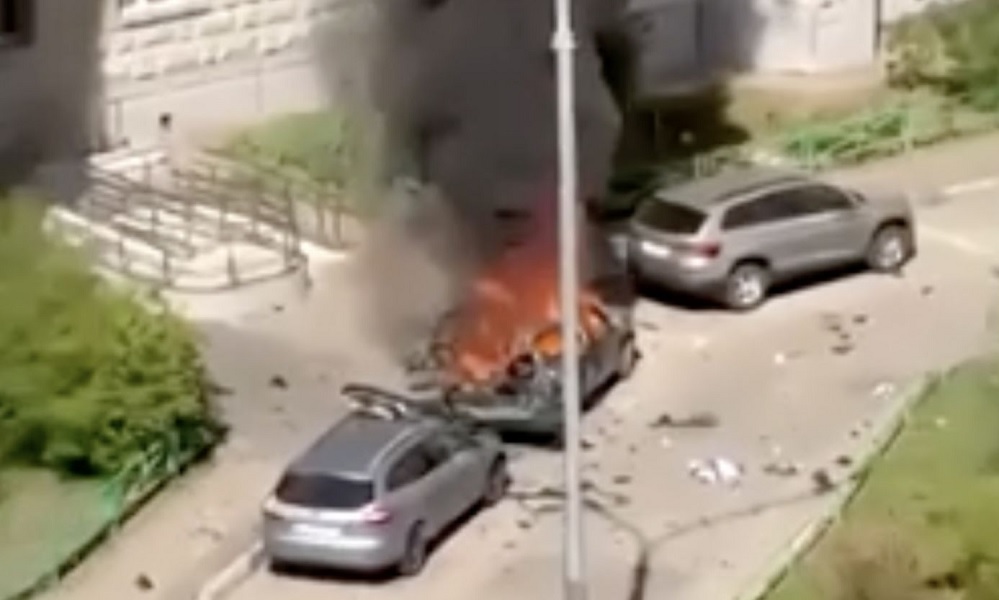
A senior Russian military officer was killed when a car exploded on Friday in the town of Balashikha just east of Moscow, Russia’s Investigative Committee said.
It named the officer as Yaroslav Moskalik, deputy head of the Main Operations Directorate of the General Staff of the Russian Armed Forces, and said it had opened a criminal case into the incident, Reuters reported.
“According to available data, the explosion occurred as a result of the detonation of a homemade explosive device filled with destructive elements,” the Investigative Committee said in a statement.
The statement did not say who might be behind the incident. Several high-ranking Russian military figures have been assassinated since the start of the war in Ukraine in operations blamed by Moscow on Kyiv.
Russian media outlet Baza, which has sources in Russia’s law enforcement agencies, said a bomb in a parked car had been detonated remotely when the officer – who lived locally – walked past.
The Izvestia newspaper published video footage showing a person approaching a line of parked cars outside an apartment complex and an explosion that sent parts of a vehicle flying metres into the air.
Kommersant newspaper said a second person was also killed.
Moskalik, who held the rank of major general, had participated in several high-level Russian delegations, according to defence ministry bulletins and media reports.
He joined the Russian contingent in a meeting in October 2015 of the Normandy Format, a group made up of teams from Germany, Russia, Ukraine and France who oversaw the Minsk agreements designed to end the war between Ukraine and Russian-backed separatist forces that broke out in 2014.
Moskalik represented the army’s General Staff at the negotiations alongside Foreign Minister Sergei Lavrov and Kremlin aide Yuri Ushakov, according to the Kremlin website.
Russia’s RBC newspaper listed Moskalik as a participant in the security subgroup in the Minsk talks.
In December, Ukraine’s SBU intelligence service used a bomb hidden in an electric scooter to kill Lieutenant General Igor Kirillov, whom Kyiv accused of being responsible for the use of chemical weapons against Ukrainian troops.
The SBU did not immediately respond to a request for comment on the reported death of Moskalik.
World
Ukraine ready to hold talks with Russia once ceasefire in place, Zelenskiy says
Zelenskiy said he would be happy to meet U.S. President Donald Trump later this week when they attend the funeral of Pope Francis along with other world leaders.
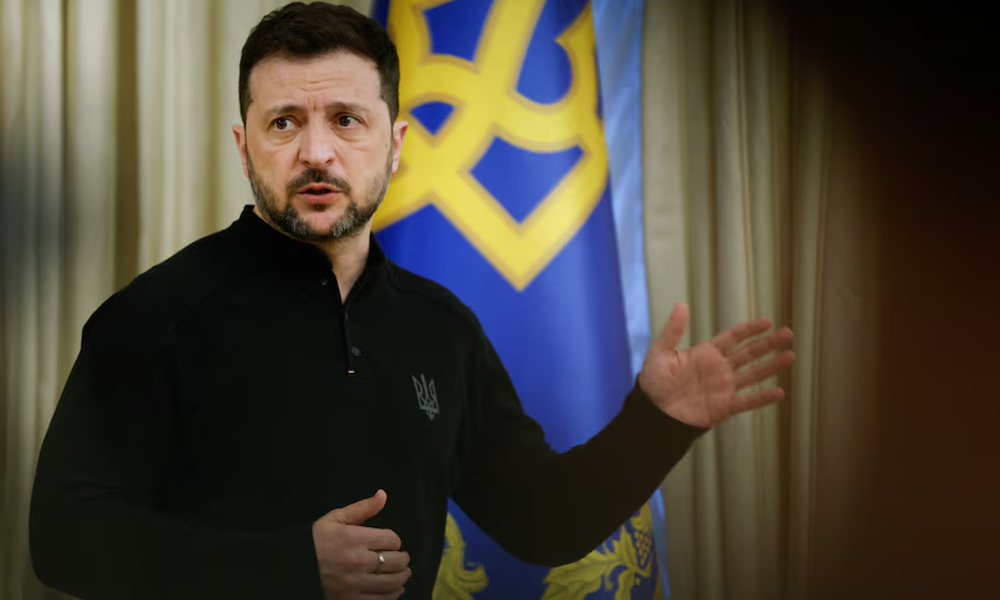
President Volodymyr Zelenskiy said on Tuesday that Ukraine would be ready to hold talks with Russia in any format once a ceasefire deal is in place and the fighting has stopped, Reuters reported.
The Ukrainian leader also told reporters at a briefing that a Ukrainian delegation meeting officials from Western countries in London on Wednesday would have a mandate to discuss a full or partial ceasefire.
“We are ready to record that after a ceasefire, we are ready to sit down in any format so that there are no dead ends,” Zelenskiy said in the presidential office in Kyiv.
“It will not be possible to agree on everything quickly,” he warned, noting numerous highly complex issues such as territory, security guarantees and Ukraine’s membership in the NATO military alliance.
He said that Ukraine would not recognise Moscow’s de jure control of the peninsula of Crimea as part of any deal as such a move would go against the Ukrainian constitution. Russia seized Crimea in 2014 and later annexed it.
Ukraine, he said, would be ready to partner with the United States to restore the work of the vast, Russian-occupied Zaporizhzhia nuclear power plant. There had been no such formal proposal from Washington about that, however, he added.
The talks in London, which are set to bring together officials from the United States, Britain, France, Germany and Ukraine, come amid a flurry of U.S.-led diplomatic efforts to find a way to end Russia’s war with Ukraine, read the report.
In an apparent change of plan, U.S. Secretary of State Marco Rubio will not be attending the talks in London, a State Department spokesperson said on Tuesday, adding that Washington’s Ukraine envoy General Keith Kellogg would attend.
Zelenskiy said he would be happy to meet U.S. President Donald Trump later this week when they attend the funeral of Pope Francis along with other world leaders.
Ukraine, Zelenskiy said, would also step up its diplomatic outreach this week and that he would meet South African President Cyril Ramaphosa, as well as the leaders of Spain, Poland and the Czech Republic.
-

 Sport5 days ago
Sport5 days agoSri Lanka A defeats Afghanistan A by 4 wickets in Abu Dhabi
-

 Business5 days ago
Business5 days agoAfghanistan’s growth prospects remain uncertain amid global uncertainty: World Bank report
-
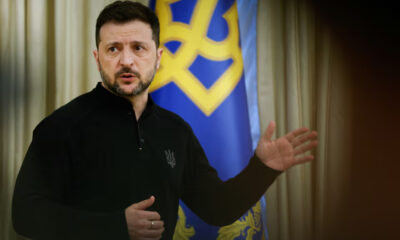
 World5 days ago
World5 days agoUkraine ready to hold talks with Russia once ceasefire in place, Zelenskiy says
-

 Latest News4 days ago
Latest News4 days agoAWCC activates new site in Nangarhar’s Kuz Kunar district
-

 Latest News4 days ago
Latest News4 days agoTarig Ali Bakheet and Japan’s Deputy Foreign Minister discuss Afghanistan’s situation
-

 Climate Change5 days ago
Climate Change5 days agoPowerful earthquake of 6.2 magnitude shakes Istanbul
-

 Business4 days ago
Business4 days agoPakistan’s deputy PM discusses Trans-Afghan Railway Line project with Uzbek FM
-

 Latest News5 days ago
Latest News5 days agoSpecial meeting will be held to launch Afghanistan–Russia joint commission, says Kabulov


